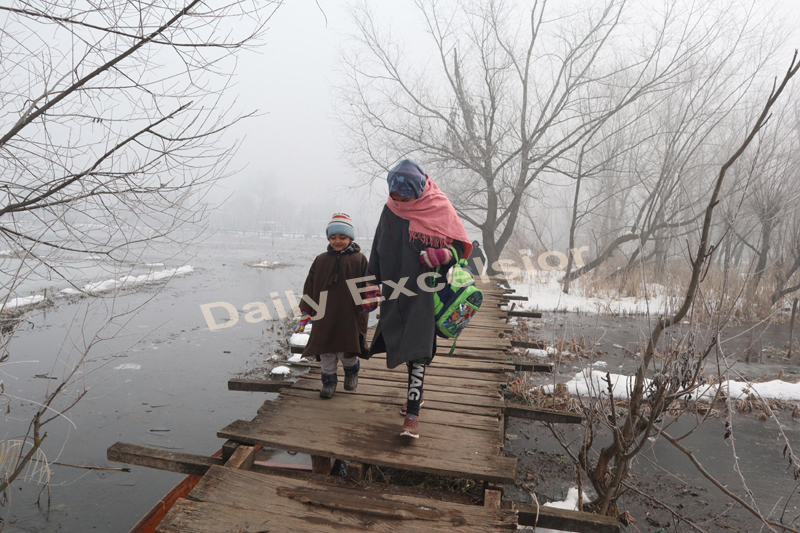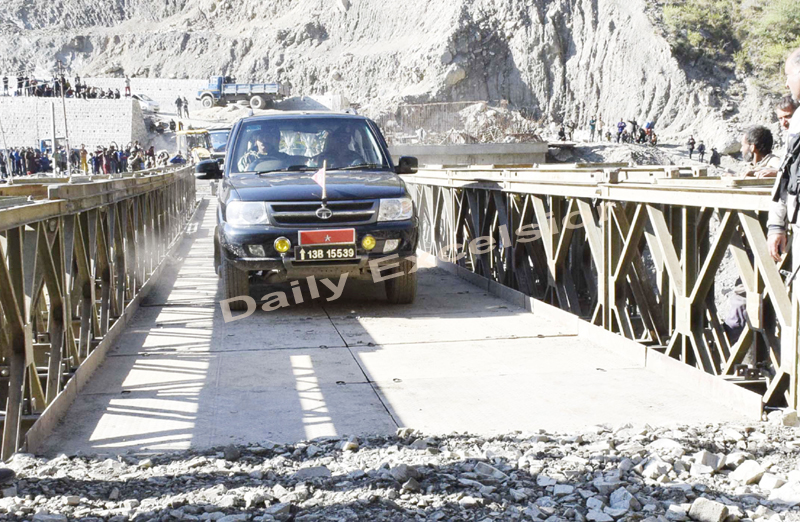Cold wave continues in Kashmir
Nishikant Khajuria / Fayaz Bukhari
JAMMU/SRINAGAR, Jan 16: The vehicular traffic on Jammu-Srinagar National Highway (NH44) was restored today with the completion of Bailey bridge at landslide hit Kaila Morh in Ramban, thus ensuring resumption of supply line to Kashmir valley, which continued to freeze with dense fog and cold wave.
The vehicles stranded on Jammu-Srinagar National Highway for a week were allowed to move and pass over the Bailey Bridge, which was erected by Border Roads Organization (BRO) in a record time and thrown open this evening after successful trial run.
The trial run on the Bailey bridge was successfully conducted by the Chief Engineer, Beacon of BRO, Brigadier IK Jaggi, this afternoon at 2.45 pm and after giving some final touches, the stranded vehicles were allowed to pass over it after 7 pm.
Click here to watch video
According to the traffic authorities, movement of the stranded vehicles is being followed by Srinagar bound trucks carrying essential commodities and restore the supply line to Kashmir.
The vehicular traffic on the 270 Km NH44 between Jammu and Srinagar was suspended for the past seven days since January 10 due to the sinking of a retention wall and about 15 mt road stretch near a bridge at Kaila Morh in Ramban.

— Excelsior/Shakeel
As the restoration work on retention wall is likely to take more that 10 days for the completion, the BRO had started constructing Bailey bridge for restoring vehicular movement on the road as early as possible. The work on 120-feet long Bailey bridge began on last Wednesday and continued round the clock getting it completed in 60 hours against the stipulated time of 72 hours, said Brig Jaggi of BRO, adding that the material for Bailey bridge was brought from different parts of Kashmir and Kishtwar district in as many as 30 trucks.
The 40 ton Bailey bridge was constructed by the BRO team, headed by Commandant, 760 Border Roads Task Force (BRTF), NK Dixit and OC, 99 RCC (Road Construction Company), GREF, Lt Col Varun Khera and closely monitored by officers from district and Police department.
ADGP Traffic J&K, T Namgyal; DC Ramban, Nazim Zai Khan; SSP Traffic J S Johar; ADC , Ramban, Harbans Lal, ASP Rajni Sharma and PD NHA1, Parshotam Kumar also visited the spot.
Meanwhile, Kashmir continued to freeze as the mercury plummeted to minus 8.2 degree Celsius in Srinagar with majority of people without tap water which are mostly frozen across the region.
The dense fog engulfed Srinagar and other parts of the Valley for the second day causing visibility issues for motorists in the morning.
A Meteorological Department official said that the minimum temperature remained almost six degrees below normal in Srinagar for the fourth consecutive day.
Srinagar recorded minus 8.2 degree Celsius, 0.2 degree Celsius up from January 14 when it was recorded minus 8.2 degree Celsius, the lowest in last 30 years.
Dal lake and other water bodies continued to be frozen. A thick layer of fog engulfed many areas in the Valley, including Srinagar, causing traffic disruptions. However, the conditions eased as the day progressed.
The boatmen faced difficulty in rowing their boats in the frozen lake. They had to cut the ice to make way for their boats. The other water bodies including ponds were also frozen across Kashmir.
The water taps continued to be frozen leading to water shortage across Kashmir. In the morning and evening the roads had become a sheet of ice causing slippery conditions.
Meanwhile, the minimum temperatures continued far below normal in other parts of the Valley, settling at minus 9.4 degree Celsius in Pahalgam against minus 8.6 degree Celsius on the previous night.
Qazigund recorded a low of minus 10.0 degree Celsius against 8.3 degree Celsius on the previous night and was the coldest place in the Valley. Kokernag recorded a low of minus 8.7 degree Celsius against minus 8.4 degree Celsius the previous night.
Against minus 5.7 degree Celsius on the previous night in Kupwara, the mercury settled at minus 6.8 degree Celsius in the north Kashmir district.
Gulmarg recorded a low of minus 5.4 degree Celsius against minus 5.7 degree Celsius on the earlier night.
Leh recorded a low of minus 12.1 degree Celsius against previous night’s minus 11.6 degree Celsius, Kargil recorded minus 19.0 degree Celsius against minus 17.6 degree Celsius on the night earlier while Drass was coldest at minus 25.8 degree Celsius.
Kashmir is in the middle Chillai-Kalan, the 40-day winter period which commenced on December 21 and ends on January 31. The period is considered the harshest of the winter when the chances of snowfall are most frequent and maximum.
The cold wave, however, continued seven after that in Kashmir with a 20-day-long ‘Chillai-Khurd’ (small cold) and a 10-day-long ‘Chillai-Bachha’ (baby cold). Already, Kashmir valley received heavy snowfall earlier this month, disrupting normal life.
The Weatherman has forecast “mainly dry weather with morning fog and mist at isolated places of Kashmir valley and plains of Jammu division” in the next 24 hours and no significant change till January 20.


